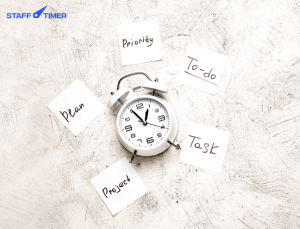Organizational Efficiency vs Organizational Effectiveness: Key Differences
Whether you’re an employee, employer, or freelancer, you must have heard of organizational efficiency and effectiveness. Both words may denote progress towards a certain goal but key differences still exist.
In the business world, success depends mostly on how well a team is able to stick to work procedures in order to achieve certain goals. This is called organizational effectiveness.
However, another metric to measure success is called organizational efficiency. This involves how well employees accomplish a task without wasting time, effort, or resources.
To make sure your business stays on the right trajectory, it’s important to be clear on the slight distinction between organization efficiency and effectiveness.
Importance of Organizational Effectiveness
Organizational effectiveness basically measures how effective an organization is at achieving its goals.
The advantages of effectiveness in business include:
-
- Employee engagement and performance
- Better management
- Decreased costs
- Improved customer engagement
- Efficient use of technology
- Better organizational outputs
At the end of the day, organizational benefits will depend on the actual business practices.
Importance of Organizational Efficiency
Organizational efficiency basically refers to using an organization’s least possible inputs in order to produce the highest possible outputs. Its importance can’t be overstated.
Wouldn’t it be more profitable for a business producing 10 units of production by spending $4 to start producing the same number of units in $3?
Organizational efficiency has a big impact on organizational effectiveness. Why? Because increased organizational efficiency makes plan implementation both cheaper and smoother.
How to Improve Organizational Effectiveness
The main key to organizational effectiveness lies in utilizing the right tools and strategies to accomplish certain goals. Here’s what you should do:
-
Make good use of human resources
Never underestimate your HR department as it plays a major role in the organizational effectiveness of a company. They help design new business strategies and hire new employees, greatly impacting company goals.
-
Maintain focus on education and growth
As a business leader, you need to take proper measures to work with different teams and individuals. Take into account the education of professionals in different fields before implementing important changes. Find out about their strengths and weaknesses in order to effectively lead them.
-
Always keep your customers in mind
If you don’t even know the needs and interests of your consumers, how are you going to improve organizational effectiveness? Always provide products and services that are needed by your customers. Or make your consumers want that product.
-
Make only quality products or services
A successful business needs to deliver high-quality consistent products and services. The key here is to maintain a balance between quality and cost-effectiveness. Or else you’ll soon find your business in a loss.
-
Utilize modern technology
Make use of computers, tablets, or mobile devices improve both the effectiveness and efficiency of your business or organization. Utilize sharing tools to keep team members up-to-date with the state of a project. Also, use technology to guard your business and clients’ information from hackers.
How to Improve Organizational Efficiency
The methods to achieve greater organizational efficiency is not always clear. But don’t worry. We’ve compiled a list of ways to improve organizational efficiency.
-
Communicate
Create a culture of open-communication such that lower-level employees are not afraid of voicing their concerns to upper management. This will allow managers to respond more effectively to problems.
-
Automate
A rote human function being replaced by automation is usually a healthy sign for business. This allows your employees to focus on the more innovative side of the business, leaving repetitive tasks to machines.
-
Outsourcing
In order to spend your time more effectively, outsource functions that fall outside of your domain of expertise. For example, HR management, computer programming, legal issues, etc. can be outsourced to experts that know what they’re doing.
-
Avoid time wastage
Don’t waste your precious time on things that can be easily avoided. For example, don’t make your entire team sit in a meeting that is largely irrelevant to their daily tasks and activities. A small meeting followed by a concise memo should be sufficient.
-
Hire remote workers
Recent studies suggest allowing employees to work from their homes will increase efficiency and output.
Read More: Types of Management Styles
Factors that Determine Organizational Effectiveness
Factors that determine an organization’s effectiveness include:
-
People
Your employees operate and manage the business under the employer’s lead. Is it any wonder that their performance will affect an organization’s effectiveness? You need to focus on their skills, behavior, and culture among other things.
-
Processes and Systems
Business processes should be efficient, fast, and profitable. They include workflows, procedures, and tasks. Every business is unique. This means that every organization should look for processes that perfectly suit their business needs.
-
Tools and Technology
The right tools and technology can easily improve the effectiveness and results across all organizational functions. However, if you choose improper or wrong tools then your business is going nowhere anytime soon. Examples of tools and technology include software, IT infrastructure, and training programs.
-
Mission, Strategy, and Vision
An organization’s mission, strategy, and vision are critical to its overall effectiveness. This includes the philosophy of an organization, market positioning, and overall strategy. All of this contributes to many other business fields.
-
Organizational Structure
An organization’s structure heavily impacts its effectiveness. Common structures include top-down, flat, and some other structures. However, there is no “best” approach to organizational structure as it is all relative.







